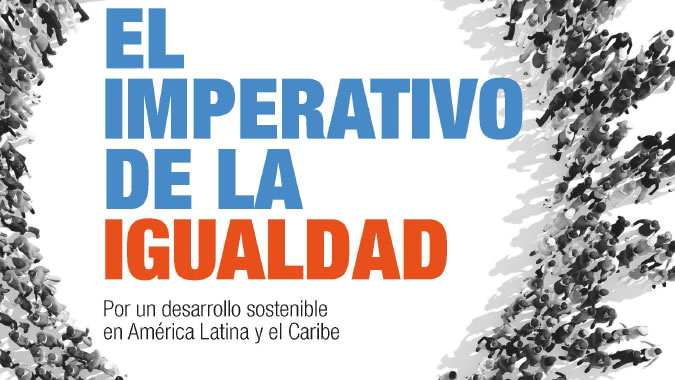Press Release
Equality, understood as the full entitlement to rights, is the skyline to be reached by the region’s development model because this principle, along with freedom, is the most humane form of taking responsibility for the tasks of modernity, Alicia Bárcena, Executive Secretary of the Economic Commission for Latin America and the Caribbean (ECLAC), and Antonio Prado, Deputy Executive Secretary, say in the book The Imperative of Equality: For Sustainable Development in Latin America and the Caribbean (Spanish only), which was just published by the regional organization and Siglo XXI Editores.
What do we mean when we talk of equality?, the United Nations senior officials asked in the 250-page text, which is being released in the context of ECLAC’s thirty-sixth session of ECLAC, the biennial meeting that will take place on May 23-27 in Mexico City, Mexico.
This new book synthesizes and discusses the main ideas of the three position documents presented by ECLAC in its latest sessions held in Brazil, El Salvador and Peru: Time for Equality: Closing Gaps, Opening Trails (2010), Structural Change for Equality (2012) and Compacts for Equality (2014).
Horizons 2030: Equality at the Centre of Sustainable Development will be added to this “Equality Trilogy,” and this document will be officially presented by Alicia Bárcena to the region’s countries on Thursday, May 26 during the meeting in Mexico.
Equality, as a normative principle and strategic skyline, has multiple dimensions Bárcena and Prado stress. Their reflections are based on the historic-structural thinking developed by ECLAC since its origins almost seven decades ago, analytically renewed in recent years in the face of new global challenges.
These dimensions are equality of rights in a democratic environment as a condition of citizenship; equality of means, related to the autonomy of people and groups; relational equality, linked to the inclusion of disadvantaged sectors, and gender equality between men and women.
The text makes special mention of indigenous peoples, who suffer situations of profound inequality in all the identified dimensions. The region’s “structural heterogeneity” is based on inequality, ECLAC says, causing the productive and social gaps that reproduce the different inequalities.
“The challenge ahead consists of promoting the productive diversification with the preservation of environmental sustainability and the building of new institutions that promote equality in its diverse spheres,” Bárcena and Prado say in this book, which invites one to rethink in a comprehensive and multidimensional way the goals and strategies of national and global policies, with the spirit of laying down foundations of an agenda for the future.
You can follow all the details of the meeting on social media using the hashtags #Horizontes2030 and #Horizons2030.
More information:
- Complete book. The lmperative of Equality: For Sustainable Development in Latin America and the Caribbean.
- Thirty-sixth session of ECLAC
- Video. Equality at the Centre of Sustainable Development: Message from ECLAC’s Executive Secretary.
For questions related to press coverage, contact:
In Mexico City: María Luisa Díaz de León, Public Information Official, ECLAC’s Subregional Headquarters in Mexico. E-mail: marialuisa.diaz@cepal.org; Telephone: (52 55) 41705665.
In Santiago, Chile: Félix Ibáñez, Officer-in-Charge of ECLAC’s Public Information Unit. E-mail: prensa@cepal.org; Telephone: (56) 22210 2040.



